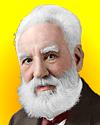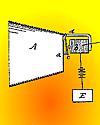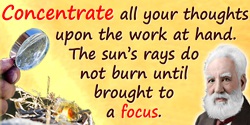 (source)
(source)
|
Alexander Graham Bell
(3 Mar 1847 - 2 Aug 1922)
Scottish-American inventor of the telephone (patented 7 Mar 1876), and cofounder of the Bell Telephone Company (1877).
|
Alexander Graham Bell
“Mr. Watson—Come here”
Illustrated Quote - Medium (500 x 250 px)
More Alexander Graham Bell quotes on science >>
Alexander Graham Bell made a written record of his experiment transmitting these now famous words. They were spoken on 10 Mar 1876, and two days later, he described his successful transmission of voice along wires, in the first volume of his notebooks about Experiments made by A. Graham Bell:
I then shouted into M [the mouthpiece] the following sentence: “Mr. Watson—Come here—I want to see you.” To my delight he came and declared that he had heard and understood what I said. I asked him to repeat the words. He answered
“You said—‘Mr. Watson—come here—I want to see you.’”
We then changed places and I listened at S [the reed receiver] while Mr. Watson read a few passages from a book into the mouth piece M. It was certainly the case that articulate sounds proceeded from S. The effect was loud but indistinct and muffled. If I had read beforehand the passage given by Mr. Watson I should have recognized every word. As it was I could not make out the sense—but an occasional word here and there was quite distinct. I made out “to” and “out” and “further”; and finally the sentence
“Mr. Bell do you understand what I say? Do—you—un—der—stand—what—I—say”
came quite clearly and intelligibly.
The notebooks show sketches of the variations of the experimental apparatus. It looked nothing like the devices you think of as a telephone. It had a liquid transmitter. Using the device Bell tested the day before, on 9 Mar 1876, he did not speak forward into a cone. He bent over and talked into a hole in an inverted box, with its face-down side covered by a diaphragm. Attached to that, a platinum needle vibrated in a glass bowl of water made more conductive with added sulphuric acid.
The additional circuitry can be seen in Bell’s notebook sketches. A stationary electrode in the water was connected via a battery to the receiver (an electromagnetic coil with a thin reed, S, fastened over its pole), and the circuit was completed with a wire back to the needle on the membrane, m, of the mouthpiece, M. Vibrations in the water caused a small variation in current through it, which caused a slight matching vibration in the reed on the receiver coil.
Wires ran down the hall, to Mr. Watson with the receiver, in a room that had its door closed. Behind the closed door of his room at the other end of the hall, Bell shouted into his mouthpiece. The result that day was the sound heard from the receiver was no better than an “indistict mumbling,” but it did have the tantalizing characteristics of speech.
Success came when Bell used a refined model the next day, 10 Mar 1876. This time the box was replaced with a chamber that had a speaking tube mouthpiece. It worked, and the utterances quoted above became some of the most famous spoken words in history.
You didn’t know how primitive that first telephone apparatus was, did you? But it carried the first transmission of voice, and Bell greatly improved upon his concept in the years to come.
- Science Quotes by Alexander Graham Bell.
- 3 Mar - short biography, births, deaths and events on date of Bell's birth.
- Alexander Graham Bell - context of quote “Mr. Watson—Come here” - Large image (800 x 400 px)
- Alexander Graham Bell - Graduation address on Discovery and Invention (1914).
- Alexander Graham Bell, by Edwin S. Grosvenor, Morgan Wesson. - book suggestion.
- Booklist for Alexander Graham Bell.


500x350px.jpg)
800x350px.jpg)





